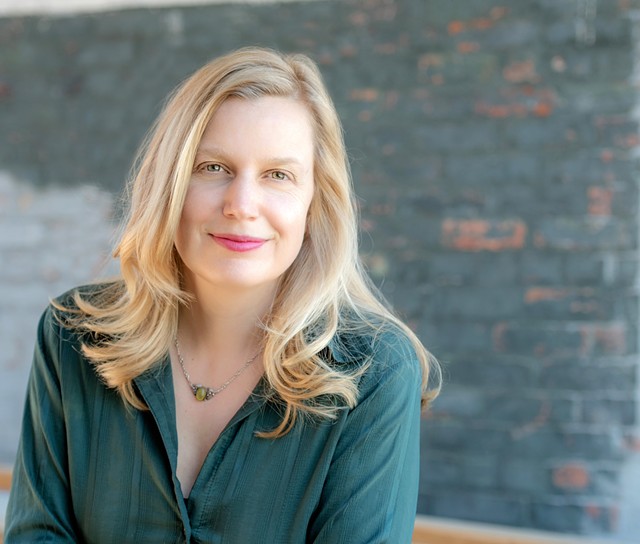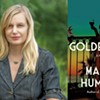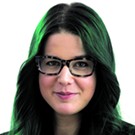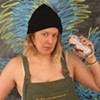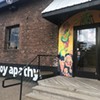Switch to the mobile version of this page.
Vermont's Independent Voice
- News
- Arts+Culture
- Home+Design
- Food
- Cannabis
- Music
- On Screen
- Events
- Jobs
- Obituaries
- Classifieds
- Personals
Browse News
Departments
Browse Arts + Culture
View All
local resources
Browse Food + Drink
View All
Browse Cannabis
View All
-
Culture

'Cannasations' Podcaster Kris Brown Aims to 'Humanize'…
-
True 802

A Burlington Cannabis Shop Plans to Host…
-
Business

Judge Tosses Burlington Cannabiz Owner's Lawsuit
-
Health + Fitness

Vermont's Cannabis Nurse Hotline Answers Health Questions…
-
Business

Waterbury Couple Buy Rare Vermont Cannabis License
Browse Music
View All
Browse On Screen
Browse Events
View All
Quick Links
Browse Classifieds
Browse Personals
-

If you're looking for "I Spys," dating or LTRs, this is your scene.
View Profiles
Special Reports
Pubs+More
Tuesday, October 3, 2017
Words 'Motherland' Author Maria Hummel Reads at Rice Memorial High School
Posted By Sadie Williams on Tue, Oct 3, 2017 at 5:25 PM
This weekend, author Maria Hummel will give a reading from her 2014 novel Motherland as part of the centennial celebrations at Rice Memorial High School in South Burlington.
The book follows the newly married Liesl as she raises her absent husband's three children in the height of World War II in Nazi Germany. Liesl and her husband, Frank, aremitlaufer , "Germans who 'went along' with Nazism," according to the author's website.
While the family is perhaps safe from Nazi persecution, they must survive dwindling food supplies, Allied air strikes and one child's mysterious illness, which puts him at risk of being sent to Hadamar, a psychiatric hospital infamous for mass sterilizations and murder.
The novel is inspired in part by stories from Hummel's father, a former English teacher at Rice, and letters between his parents. Those writings remained hidden until the 1980s when they were found by a couple renovating a house in Germany where Hummel's grandfather had stashed them 50 years prior.
Hummel is the author of two novels and one collection of poems. Her next book, Still Lives, is forthcoming. She graduated from Rice in 1990 and the University of Vermont in 1994. Two years ago, after two decades away from the Green Mountain State — most recently teaching at Stanford — she moved back. She's now teaching English at the University of Vermont.
Hummel reads at Rice on Saturday, October 7 at 3 p.m. Seven Days caught up with the author over the phone to talk about coming back to Vermont, the difficulties of writing Motherland, and why it's still important to read literature about people who didn't either openly object to, or actively fulfill, the Nazi regime.
SEVEN DAYS: What brought you back to Vermont?
MARIA HUMMEL: In large part, it was the position at UVM. I went [there] and it was exciting for me. I had great professors who were supportive of me as a writer, and one of their positions was open, so it was a real coming full circle [moment] to step into the shoes of someone who supported me.
SD: What were you studying there?
MH: I was an environmentalstudies major. I was taking so many writing classes that the department head asked me, "Why don't you become an English major?" Before I went to UVM, I didn't know that there were living writers — that there was this whole culture of writers. It didn't seem like an option to me.
SD: From your website, it sounds like you wrote a book of poems, House and Fire, and Motherland around the same time. Is that accurate?
MH: Yeah. Looking back on it, I think I was going through a really difficult set of emotions at the time with my son's illness, and I needed both the stories and the [poems] to get through it. Even though [Motherland is] about many things and not all of them have to do with motherhood, burying myself in the story was a refuge in one way. And House and Fire was a way to inhabit the moments I was living, and be open to them — be open to the suffering. I kind of felt like I had to be doing both because I couldn't always be in that hospital room.
SD: So Motherland is set in Nazi Germany. What does it feel like to write about characters — real people — who were on the edge, or embedded, in pro-Nazi society? I'd imagine it affects you long after you put your pen down.
MH: The biggest hurdle was point of view. Originally, the first draft was written by a character, in the first person, who no longer exists in the book. And I also had to shrug the idea that the woman's story wasn't the interesting one, which is something that is sort of an inherited thing: If it's a story about war, it's about the soldier's experience and the war front. It took me a while to realize that the center of the story was the domestic life, the lives of women and children.
And of course, even with figuring all of that out, how do you deal with having characters who are being deliberately blind about one of the biggest crimes in human history? And to still love them, and be a part of their circumstance, but know that they're complicit with something in their public lives, with something that is devastating in every way to their victims and our world?
SD: When did you first find out about the letters between your grandparents?
MH: I knew about the letters since they arrived in the late ’80s, but it was more of a curiosity. [When] I was in middle school, I wanted to write about it, and my father was like, "OK, you can do this, but we should have a conversation about what you're interested in and why." He was worried about me falling into the atrocity well.
From what he told me, the classification of my grandfather and the rest of the family was the lowest level of Nazi, in terms that they were public members of the party. But once they were interrogated after the war they were sort of let go as just one of the many people who went along with it.
SD: You published Motherland in 2014. Have your feelings about your family's position and story been complicated or expanded at all in the wake of events like Charlottesville?
MH: I'm really curious if the conversations about it will be different, because of the fear of something like this happening in this country. The whole "many sides" thing [that Donald Trump said in response to Charlottesville] really bothered me. There are not "many sides." There is one side. I didn't write Motherland to write the "other side."
I still think this tension that exists in this country now — between our public and private courage. And how people are negotiating that is one of the big tensions in the book, so I'm interested in seeing what people have to say. I don't think I would change the book based on what happened, but I think the discussion would change.
SD: What do you mean bypublic and private courage, and why is it important for people to read and discuss the stories of Nazi sympathizers?
MH: Let me answer the last question first. The Holocaust is passing out of living memory. My father is 81. My friend Dana's mother, an Auschwitz survivor, is in her nineties. While I was working on Motherland, Dana and I talked often about what will transpire when no one living recalls what happened. We both agreed there was a real danger in the Holocaust becoming a myth. Once a messy human event becomes a myth, its many lessons can boil down to a single one — a story of pure good and pure evil — and we can become convinced that nothing like it will happen again.
If all literature portrays World War II-era characters in one of three categories: sadists, victims, and rescuers, we start thinking of those characters as figures in a drama of which we already know the meaning. We stop searching to understand how the Germany we know now, which recently opened its doors to millions of refugees, was also the nation that murdered millions of innocents.
As far as public and private courage, I mean that people can fail to do enough to stop their leaders from ruining the lives of strangers, but they may still work heroically to protect and nurture their own families, and particularly their own children. In hindsight, they can appear, even to themselves — perhaps especially to themselves — as hypocrites and participants in evil. But at the time they may justify their actions for the sake of those who are vitally dependent upon them.
I think of Liesl and Frank in this category. And when I contemplate the mass extinction on this planet for which future generations will judge us, I think of myself.
Correction, October 4, 2017: An earlier version of this story misquoted Maria Hummell's statement regarding her decision to focus the story on the domestic life, and not the war front.
The book follows the newly married Liesl as she raises her absent husband's three children in the height of World War II in Nazi Germany. Liesl and her husband, Frank, are
While the family is perhaps safe from Nazi persecution, they must survive dwindling food supplies, Allied air strikes and one child's mysterious illness, which puts him at risk of being sent to Hadamar, a psychiatric hospital infamous for mass sterilizations and murder.
The novel is inspired in part by stories from Hummel's father, a former English teacher at Rice, and letters between his parents. Those writings remained hidden until the 1980s when they were found by a couple renovating a house in Germany where Hummel's grandfather had stashed them 50 years prior.
Hummel is the author of two novels and one collection of poems. Her next book, Still Lives, is forthcoming. She graduated from Rice in 1990 and the University of Vermont in 1994. Two years ago, after two decades away from the Green Mountain State — most recently teaching at Stanford — she moved back. She's now teaching English at the University of Vermont.
Hummel reads at Rice on Saturday, October 7 at 3 p.m. Seven Days caught up with the author over the phone to talk about coming back to Vermont, the difficulties of writing Motherland, and why it's still important to read literature about people who didn't either openly object to, or actively fulfill, the Nazi regime.
SEVEN DAYS: What brought you back to Vermont?
MARIA HUMMEL: In large part, it was the position at UVM. I went [there] and it was exciting for me. I had great professors who were supportive of me as a writer, and one of their positions was open, so it was a real coming full circle [moment] to step into the shoes of someone who supported me.
SD: What were you studying there?
MH: I was an environmental
SD: From your website, it sounds like you wrote a book of poems, House and Fire, and Motherland around the same time. Is that accurate?
MH: Yeah. Looking back on it, I think I was going through a really difficult set of emotions at the time with my son's illness, and I needed both the stories and the [poems] to get through it. Even though [Motherland is] about many things and not all of them have to do with motherhood, burying myself in the story was a refuge in one way. And House and Fire was a way to inhabit the moments I was living, and be open to them — be open to the suffering. I kind of felt like I had to be doing both because I couldn't always be in that hospital room.
SD: So Motherland is set in Nazi Germany. What does it feel like to write about characters — real people — who were on the edge, or embedded, in pro-Nazi society? I'd imagine it affects you long after you put your pen down.
MH: The biggest hurdle was point of view. Originally, the first draft was written by a character, in the first person, who no longer exists in the book. And I also had to shrug the idea that the woman's story wasn't the interesting one, which is something that is sort of an inherited thing: If it's a story about war, it's about the soldier's experience and the war front. It took me a while to realize that the center of the story was the domestic life, the lives of women and children.
And of course, even with figuring all of that out, how do you deal with having characters who are being deliberately blind about one of the biggest crimes in human history? And to still love them, and be a part of their circumstance, but know that they're complicit with something in their public lives, with something that is devastating in every way to their victims and our world?
SD: When did you first find out about the letters between your grandparents?
MH: I knew about the letters since they arrived in the late ’80s, but it was more of a curiosity. [When] I was in middle school, I wanted to write about it, and my father was like, "OK, you can do this, but we should have a conversation about what you're interested in and why." He was worried about me falling into the atrocity well.
From what he told me, the classification of my grandfather and the rest of the family was the lowest level of Nazi, in terms that they were public members of the party. But once they were interrogated after the war they were sort of let go as just one of the many people who went along with it.
SD: You published Motherland in 2014. Have your feelings about your family's position and story been complicated or expanded at all in the wake of events like Charlottesville?
MH: I'm really curious if the conversations about it will be different, because of the fear of something like this happening in this country. The whole "many sides" thing [that Donald Trump said in response to Charlottesville] really bothered me. There are not "many sides." There is one side. I didn't write Motherland to write the "other side."
I still think this tension that exists in this country now — between our public and private courage. And how people are negotiating that is one of the big tensions in the book, so I'm interested in seeing what people have to say. I don't think I would change the book based on what happened, but I think the discussion would change.
SD: What do you mean by
MH: Let me answer the last question first. The Holocaust is passing out of living memory. My father is 81. My friend Dana's mother, an Auschwitz survivor, is in her nineties. While I was working on Motherland, Dana and I talked often about what will transpire when no one living recalls what happened. We both agreed there was a real danger in the Holocaust becoming a myth. Once a messy human event becomes a myth, its many lessons can boil down to a single one — a story of pure good and pure evil — and we can become convinced that nothing like it will happen again.
If all literature portrays World War II-era characters in one of three categories: sadists, victims, and rescuers, we start thinking of those characters as figures in a drama of which we already know the meaning. We stop searching to understand how the Germany we know now, which recently opened its doors to millions of refugees, was also the nation that murdered millions of innocents.
As far as public and private courage, I mean that people can fail to do enough to stop their leaders from ruining the lives of strangers, but they may still work heroically to protect and nurture their own families, and particularly their own children. In hindsight, they can appear, even to themselves — perhaps especially to themselves — as hypocrites and participants in evil. But at the time they may justify their actions for the sake of those who are vitally dependent upon them.
I think of Liesl and Frank in this category. And when I contemplate the mass extinction on this planet for which future generations will judge us, I think of myself.
Correction, October 4, 2017: An earlier version of this story misquoted Maria Hummell's statement regarding her decision to focus the story on the domestic life, and not the war front.
Tags: Maria Hummel, Rice Memorial High School, Burlington, books, Motherland, Image, Web Only
Comments
Showing 1-1 of 1
Comments are closed.
Since 2014, Seven Days has allowed readers to comment on all stories posted on our website. While we’ve appreciated the suggestions and insights, the time has come to shut them down — at least temporarily.
While we champion free speech, facts are a matter of life and death during the coronavirus pandemic, and right now Seven Days is prioritizing the production of responsible journalism over moderating online debates between readers.
To criticize, correct or praise our reporting, please send us a letter to the editor. Or send us a tip. We’ll check it out and report the results.
Online comments may return when we have better tech tools for managing them. Thanks for reading.
Related Locations
-
Rice Memorial High School
- 99 Proctor Avenue, South Burlington Chittenden County VT
- 44.45267;-73.20026
-
Be the first to review this location!































